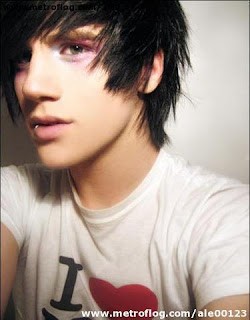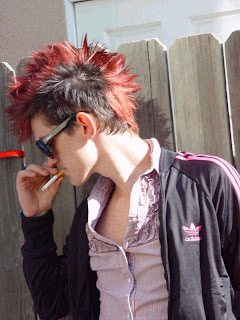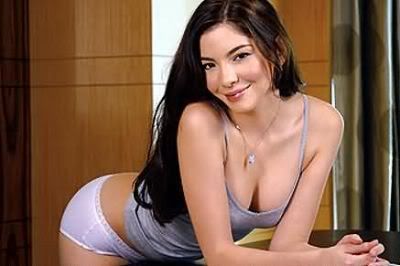The band "Refused" popularised the
emo hair with their uniform appearance in this music video for the "New Noise" single.As with clothing, the hairstyles of emo kids vary depending on the individual and on his/her music influences. However, there are several common aspects of emo hairstyles.
For one, because the emo scene is very DIY-oriented, hair that is not professionally cut is considered to be more scene than hair that is. Emo kids have their friends cut their hair, or they cut it themselves. Jet black, bleached blonde, or dark hair with a reddish or purplish tinge are all very emo, as is hair with distinct sections of contrasting colors (all-over black hair with a section of bleached blonde in the undermost layer of the back is quite common).
Emo hair is short-ish, and does not differ much from gender to gender. It is common for boys and girls to have oily and/or shaggy hair that covers the eye and reaches the shirt-collar. Boys usually wear theirs unkempt and girls may wear clips on the front. It is common for both to have bangs cut straight across their browridges, and swept to one side.
The most common emo hair
What is most commonly implied by the term "emo" in reference to hair is dyed jet-black hair that is sloped to cover, or partially cover, one of the eyes (usually the right eye). Sometimes this is known as the "emo comb-over", because the way the
emo hair sweeps from the back of the head looks like the way an old man would grow a patch of comb-over hair to hide a bald spot. The popularisation of this hairstyle is often attributed to the band Refused, whose members had uniform jet black hair sloped to partially obscure the right eye. The uniform dress code of the band has also been an influence of emo fashion — especially the fashioncore strand — in general.
As the term "emo" has become more and more ingrained in the popular conscience, "emo hairs" have come to include a much wider array of styles. These more complex styles are largely associated with the fashioncore style of emo fashion and are most commonly sported by scene kids.
The Scene/Devilock haircut
AFI frontman Davey Havok with what is commonly referred to as the Havok Devilock. The origins of one of the most popular emo hairstyles are largely attributed to The Cure, The Misfits and AFI. Robert Smith of The Cure had his long hair drooping over his eyes, but had the back slightly shorter and spiked out. Jerry Only of The Misfits invented a haircut in the late 1970s/early 1980s known as a "devilock" which involved the hair to be cut short, but leaving the fringe to grow very long and to be combed forward over the eyes. Only, guitarist Doyle and former lead singer Glenn Danzig all wore the style and dyed their hair black. Most members of The Misfits have sported the style or one similar at one point or another. During the "All Hallows EP" and "The Art of Drowning"-era, AFI frontman Davey Havok used to have a haircut that mixed these two styles together, cutting his hair short by way of the standard hardcore punk shirt and spiky haircut, but left only his immediate fringe to grow long, at least down to his chin. He also dyed his blond hair black from a very young age. Since the appearance of this variation of the devilock, the two have been given names: The Only Devilock and The Havok Devilock. These two, and in particular Havok's variation, are an obvious precursor to what has become known as "scene" hair.
The neo-mullet
Lostprophets guitarist Mike Lewis sports a neo-mullet. Also referred to as a skewed mullet or 90-degree mullet, this is an updated version of the much-derided classic mullet haircut. The basic "business at the front, party in the back" cut is often modified with a longer piece of hair on one side at the back, whilst the front section of the cut often partially obscures one eye (most commonly the "tail" at the back slopes to the left while the fringe slopes to the right). This haircut is commonplace amongst both male and female scene kids. The hair is almost always dyed jet black, and it is then commonplace for sections to be highlighted either blonde or red.





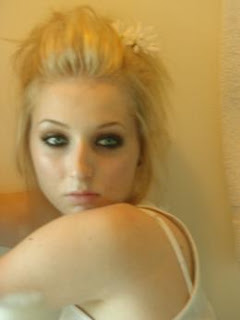

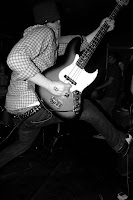 Sadly, a lot of people have very limited opinions (and ideas) about emotional hardcore music, or emo music. Some would even assume that for as long as the lyrics aren't clear and the lead vocalist is singing on hyper drive, then it must be emo music. What most of you didn't know is that emo developed from music recorded on vinyl. It can be considered Indie, sure, but it most probably emerged into being before they even had a name for it. With its roots in hardcore punk, emo music is bringing the core of punk music into a whole different level. With people buying more CDs, downloading stuff off the net, and investing in music hardware or software like there was no tomorrow, I wouldn't be surprised if emo music became another solid category all on its own, like pop rock or country.
Sadly, a lot of people have very limited opinions (and ideas) about emotional hardcore music, or emo music. Some would even assume that for as long as the lyrics aren't clear and the lead vocalist is singing on hyper drive, then it must be emo music. What most of you didn't know is that emo developed from music recorded on vinyl. It can be considered Indie, sure, but it most probably emerged into being before they even had a name for it. With its roots in hardcore punk, emo music is bringing the core of punk music into a whole different level. With people buying more CDs, downloading stuff off the net, and investing in music hardware or software like there was no tomorrow, I wouldn't be surprised if emo music became another solid category all on its own, like pop rock or country. Sadly, a lot of people have very limited opinions (and ideas) about emotional hardcore music, or emo music. Some would even assume that for as long as the lyrics aren't clear and the lead vocalist is singing on hyper drive, then it must be emo music. What most of you didn't know is that emo developed from music recorded on vinyl. It can be considered Indie, sure, but it most probably emerged into being before they even had a name for it. With its roots in hardcore punk, emo music is bringing the core of punk music into a whole different level. With people buying more CDs, downloading stuff off the net, and investing in music hardware or software like there was no tomorrow, I wouldn't be surprised if emo music became another solid category all on its own, like pop rock or country.
Sadly, a lot of people have very limited opinions (and ideas) about emotional hardcore music, or emo music. Some would even assume that for as long as the lyrics aren't clear and the lead vocalist is singing on hyper drive, then it must be emo music. What most of you didn't know is that emo developed from music recorded on vinyl. It can be considered Indie, sure, but it most probably emerged into being before they even had a name for it. With its roots in hardcore punk, emo music is bringing the core of punk music into a whole different level. With people buying more CDs, downloading stuff off the net, and investing in music hardware or software like there was no tomorrow, I wouldn't be surprised if emo music became another solid category all on its own, like pop rock or country.